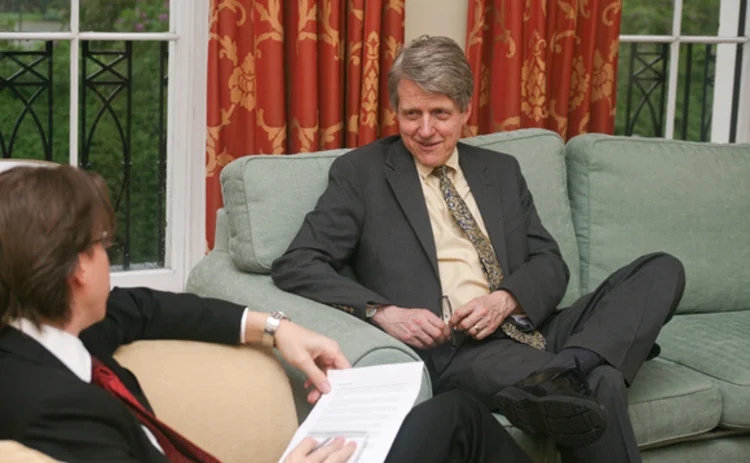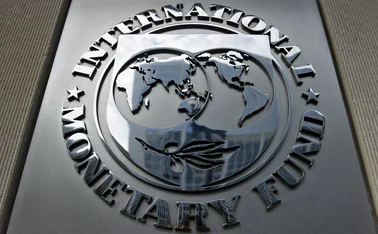
Robert Shiller on central banks and their role in a good society
Interview: Robert Shiller

Robert J Shiller is the Arthur M Okun professor of economics, Department of Economics and Cowles Foundation for Research in Economics, Yale University, and professor of Finance and Fellow at the International Center for Finance, Yale School of Management. He received his BA from the University of Michigan in 1967 and his PhD in economics from MIT in 1972. He has written on financial markets, financial innovation, behavioural economics, macroeconomics, real estate, statistical methods, and on public attitudes, opinions, and moral judgments regarding markets. His 1989 book Market Volatility (MIT Press) is a mathematical and behavioural analysis of price fluctuations in speculative markets. His 1993 book Macro Markets: Creating Institutions for Managing Society’s Largest Economic Risks (Oxford University Press) proposes a variety of new risk-management contracts, such as futures contracts in national incomes or securities based on real estate that would permit the management of risks to standards of living. His book Irrational Exuberance (Princeton University Press (PUP) 2000), 2nd edition (PUP 2005) is an analysis and explication of speculative bubbles, with special reference to the stock market and real estate. His book The New Financial Order: Risk in the 21st Century (PUP 2003) is an analysis of an expanding role of finance, insurance, and public finance in our future. His book Subprime Solution: How the Global Financial Crisis Happened and What to Do about It, published in September 2008 (PUP), offers an analysis of the housing and economic crisis and a plan of action against it. He co-authored, with George A. Akerlof, Animal Spirits: How Human Psychology Drives the Economy and Why It Matters for Global Capitalism, published in March 2009 (PUP). His book Finance and the Good Society is forthcoming in April 2012 (PUP).
You state in your published work that there is a ‘democratisation of finance’ taking place around the world and more people now have direct access to finance than at any time in the past – something you say might surprise Karl Marx. How far along that whole process are we?
I would say less than halfway. It’s a question of whether you are talking about the world or about one country. Karl Marx said that power derives from capital and he seemed not to understand that elderly people owning capital don’t really exercise power – they delegate to someone else in the form of investing in some enterprise. As society grows more inclusive, which is a definite trend, people have access to that. If you are the kind of person who might manage an enterprise, you can raise capital – Marx didn’t seem to appreciate that. He banked his theory on a certain kind of cultural change that would be managed by the communist party. The idea was that the process of liberating capital would take the form of changing everyone’s thinking – but it hasn’t happened that way. It seems that a sense of justice has grown around the world, that it is a grave injustice for one tribe to dominate and leave the others enslaved or half-enslaved – that seems to have taken hold everywhere. Liberation of capital has taken a different form than Marx expected.
For people to participate in the financial system as equals they will need full access to information and the resources to make active and intelligent choices. What practical steps need to be taken to get closer to that?
I can only give guidance because the thing that has to be done is experimentation. It’s not a matter of being ideologically pure – it’s about making financial devices that work, and incentivising people appropriately. It involves financial engineering but it should have a behavioural side because it’s inherently difficult to know how people or society will react to innovations. The process has been that experimentation is done locally, or in one country, and if it works after the experiment has been run for 30 years or so people in other countries will copy it.
You say financial innovation has the ability to transform people’s lives via instruments that protect people against being laid off or from a fall in the price of their home. How long will it take to get to such a state?
This is a process that unfolds over centuries. I’m thinking about important innovations such as indexed bonds – as far as I can tell, it was first tried in the Commonwealth of Massachusetts in 1780, and then 100 years goes by before anyone tries it again. [Economist] William Stanley Jevens was advocating it in Britain in the 1870s. Britain didn’t adopt it until the 1980s – 100 years after him. It seems to me that everything happens more slowly than you might imagine – we’re talking about major changes in society.
Is there anything you see at the moment that has perhaps been in the pipeline for the past 100 years that’s coming to the fore?
One of them is the arrival of the benefit corporation, which is in eight US states. The benefit corporation has in its charter both a profit-making goal and some ‘other’ stated goal for improving society or the environment – so it’s halfway between for-profit and non-profit. I keep coming back to a new formulation of economics, which is not so reliant on completely selfish behaviour. The experience of working for a benefit corporation is different from than that of a for-profit because you have a sense of the benevolence of the organisation and have a personal incentive to contribute to the activities of the corporation. It may end up making higher profits than conventional corporations because of the different social ambience. It’s too early to tell now – there’s only 18 months of history and the first ones aren’t necessarily the successful ones.
The second is the ‘social impact bond’ announced by the ministry of justice in the UK to help deal with recidivism at Peterborough prison. The problem they found is that 60% of people who are incarcerated for less than 12 months tend to end up back in jail after release – it is a deep social problem that’s hard to fix. They tried a different tack when they created a social impact bond, where the bond will pay out only if the recidivism rate falls by 7.5%, and it has a six-year term. Investors then bid for these bonds, and £5 million was transferred to charitable groups that work with the freed prisoners. The investors only get paid if they succeed, which means the investors had an incentive to look at the groups that are actually doing the work, review how they are doing it, and continue to review them. It’s a different incentivisation.
The third thing – just in the last month the US Congress passed a bill called the Jobs Act, with Jobs standing for ‘jumpstart our business start-ups’. It has a number of elements but the essential innovation is ‘crowd funding’. They want to facilitate websites to raise capital for new start-up businesses through thousands of small investments by individuals – again, this is really democratising. The ability to crowd fund depends on new information technology but also on protecting investors – a new law says that no investor can put more than 5% of his or her income into a crowd-funding investment in any given year.
When one thinks of financial markets there seems to be a tremendous information asymmetry between big banks and sophisticated funds compared with retail and other investors. How does one address those sorts of issues?
That’s a difficult issue. We’re seeing an increase in income inequality, and it has many origins, but it seems like people who are better informed and make a point of staying informed about business opportunities, have a higher potential of getting really rich, and it seems unjust to many people. In my latest book I look at the list of the 400 richest Americans and it didn’t seem like there was a top scientist on it. The Nobel Prize is only something like $1 million – that’s lunch money for these people.
In some sense, that is testimony to the power of financial technology. For every one of those guys on the Forbes 400, there are probably hundreds more who didn’t make it. Having some fabulously rich people may not be a bad thing for society because it creates a sense of economic freedom and a sense of opportunity that I think motivates constructive activity. In my book, I talk about the fact that human nature by itself is not so benevolent – it has some benevolence in it, but people are ‘grabby’ and that’s another human element we have to work around. It’s not onerous to society that we have some billionaires, as long as everyone is taken care of and the scientist, for example, has his lab, lives comfortably and has children who are educated – that’s a good society, even if there are billionaires in it.
There are many academically well-qualified people earning large sums of money applying scientific models to finance in Wall Street. Should more of them be incentivised to work in science or industry?
One example is the new millisecond trading – what advantage to society could that possibly have? Then there is the idea of rent-seeking – that’s a term that Anne Krueger, the development economist, coined about 30 years ago. The classic example of rent-seeking is feudal – when a lord who owned the land on both sides of the river would put a chain across the river and lower it only after boats paid him – he’s trying to collect the rent on his river. There is no contribution to society from that kind of activity. Some of that happens in human activities and not just in finance. I said people are ‘grabby’ and that is a problem. The other side of it is that maybe the loss to these things is not as great as people imagine, and that more Wall Street activities are actually productive for society than they imagine.
In terms of models that economists and others are using – are they going the right way? It seems that whenever there are major shocks the models do not work and one has to recalibrate or reengineer them.
We have been going through a behavioural finance revolution in the last 20 years. Before was another revolution called efficient markets – that revolution had unfortunate consequences and left people thinking that financial markets are more perfect than anything else. There is really a change in thinking from 30 years ago to now. But it’s unfortunate that the modern university is divided up into different departments as rigidly as they are. The problem is that economists mostly don’t know any psychology, sociology or political science. At my university, Yale, there used to be one department until 1927 called the Department of Economics, Sociology and Government – that sounds like a good way to put all of these together. Once they split and they moved them into separate buildings, they stopped talking to each other. What is prominent is that economists almost never quote sociologists – it’s extremely rare. I think sociology is a very important discipline – it offers important perspectives on what happens in modern society.
Financial innovation is also aimed at getting around rules and regulations, which may or may not be a good thing. I’m thinking of hybrid regulatory capital securities, the use of SIVs and the use of collateral debt obligations (CDOs). How do you view some of these innovations?
The SIVs were a way of getting things off balance sheet and away from regulators, so they were evading regulators – I can’t think of an advantage to that. The CDOs were financial innovations that actually did benefit society if they were done right – there were flaws in the design so we have to come with a CDO version two. CDOs themselves divide income streams up into tranches and sell them off separately to different investor classes. The so called ‘AAA tranche’ – which turned out not to be AAA unfortunately – became a way that a broad class of investors could invest in mortgages or whatever else was underlying the CDO without having to go through due diligence and investigating. The idea was ‘let’s put the least-likely-to-default into a tranche and present it to an independent rating agency who would confirm that we have done that, and then someone can invest in that.’ You can’t always be investigating everything – you need investments that are just certifiably safe. That creates an increase in potential demand for investment products so it liberates capital.
Do you see a big difference between over-the-counter and exchange-traded instruments?
We need both. Over-the-counter instruments tend to be designed expressly for a client and that is what some clients need, but the exchange-traded instruments are more democratic in that the process is open and visible and they provide better price discovery and, of course, they also provide liquidity. The US government is trying to encourage more exchange-trading. That is a good thing because the financial community may not provide sufficient incentives to make that happen. I worked with the Chicago Mercantile Exchange on developing futures markets for single-family homes, which we thought would be a democratising move because it makes a risk that had formerly been borne by individual households into something that has an organised market with liquidity and price discovery. We had the sense that Wall Street was not enthusiastic about this because it might take away some of their business in creating CDOs. They may make more money if there isn’t an organised market.
What do you think of some of the new tools that are being invented at the moment to help the banks, such as contingent capital bonds, bail-in bonds and so on?
I participated in the Squam Lake Report where we had a chapter on contingent capital and the idea is that you can issue a form of debt that is convertible into equity providing capital in times of stress. We thought it might be a good thing to have a dual trigger for the convertibility – one would be announced by the regulator in a defined economic crisis. If the regulator announces that we are in a systemic crisis they would automatically set off one of the two triggers. The other trigger would be something defined in terms of the balance sheet or income statement of the company that would automatically provide capital.
A number of parties cite the ‘failure of markets’ – in terms of understating risk prior to the crisis and exaggerating it in the aftermath – for their approval of European Central Bank intervention perhaps above and beyond its mandate. What do you think?
I’ve been a long-standing critic of market efficiency and wrote a book called Irrational Exuberance on it in 2000. Behavioural finance doesn’t accept the efficient markets hypothesis. Then, the question is: ‘what is the role of the central bank in dealing with crises like this?’ The general principle that I’ve talked about in my books is that when you have a crisis like this it seems to call for changing the rules of the game in the middle of the game, and that’s not desirable because it leaves people wondering ‘what am I doing, what are the rules?’. It leaves people on the wrong side of the bail-outs feeling wronged – such as the tax-payers who are paying for bail-outs of wealthy people.
It is important at times like this to think about changing the rules for future games so we don’t have to do it mid-game. In some sense, we do have an understanding that the central bank has an authority to respond to economic conditions as they evolve – so does the government. We set aside a separate central bank, which has now increasingly become independent, thinking that political pressures might inhibit correct action. The central bank and the government have the authority to change the rules when unanticipated events occur that couldn’t have been foreseen; that couldn’t have been written into the rules. They are doing that and they have some support for what they are doing. Still, we have to try to avoid interventions that make it difficult for people to know what the rules are.
Do you think it is right that many central banks around the world have strayed from their monetary policy mandates into what increasingly looks like fiscal policy positions given the shocks we’ve had?
I’m impressed with the coordinated activities of central banks around the world – it seems to be working. Often, our democratic institutions work better than you’d ever imagine. At the US central bank, we appoint the board of governors with 14-year terms and they can’t be removed except for extreme behaviour. The person comes in for relatively low pay with a mission. The measures the US central bank and other central banks have taken are well-meaning and somewhat effective. It comes around to human nature having a benevolent side to it – in the right environment that comes through. A high-minded culture has developed at central banks. I don’t know every central bank, but my general impression is that it’s not cynical and grabbing.
Do any of the policies or activities now look like mistakes?
We brought Henry Paulson, the former head of Goldman Sachs, to the Treasury and in the bail-out of AIG he managed to direct something like $12 billion indirectly to Goldman. That creates a sense of corruption but it doesn’t involve the central bank. But central bank lending of tax-payer money to specific companies outraged many people and there is a sense the banks own the central bank in the US.
Going further back, the real mistake they made was not understanding the real estate bubble and not understanding the potential for collapse as a result. A flaw in central banks – that maybe we’re improving – is that they have a narrow mandate. I was talking about how university is divided up into departments – the same thing happens with the government, more so in the US than the UK. The central bankers didn’t see it as their mission to think about mortgages that are being written or to worry about the shadow-banking sector, because they weren’t banks so they weren’t under supervision, so they let things go. Those are mistakes, but understandable given the bureaucratic structure.
Many central banks seem to say they have made the right decisions pre- and post-crisis given their mandates. Have they got a point, or is there a sense of denial?
The idea of supporting the markets with low interest rates is a very basic thing and that has probably worked to reduce the severity of this recession – and we had looked like we were going to fall into a worldwide recession. This time was different. The central banks of the world seemed to coordinate. They kept announcing new facilities and new programmes, and it gave the public a reason to hope.
Looking specifically at the US with quantitative easing, Operation Twist, the new inflation target and the Fed stating it will keep rates low until 2014 – has the Fed taken the right steps?
I find it inspiring that they are looking at new forms of policy. We are in the so-called ‘liquidity trap’ where interest rates – short rates at least – are zero, and long rates are very low, but the Fed succeeded in getting them even lower. That’s an innovative policy response that is probably helping a little bit. We have the lowest government bond rates in US history and I think it’s similarly low elsewhere. Japan did the same thing but it didn’t rescue them completely. But it meant that something that would have been a life-threatening disease is only a bad cold.
Do you think Western central banks have learned their lesson from Japan?
Japan had twin bubbles in the 1980s, in the stock market and the housing market. Both bubbles collapsed and it seemed to be a turning point for their economy. The government undertook fiscal policy and the central bank brought interest rates to zero, and the Japanese economy has generally grown between 1% and 2% a year over the last 20 years.
Will the West fare any better?
There is this deep-seated fear that this is a Great Depression-like phenomenon and the Depression-era policies never managed to end the Depression until we had World War II, and that creates an anxiety. It is the most severe contraction since the Great Depression and there is a sense that we don’t understand it fully.
Could the current range of measures just create another asset bubble?
In the US, the latest bubble was the third. There wasn’t any real national bubble until there was one in the 1970s, another in the 1980s, and another in the 2000s, each one bigger than the one before. It is conceivable that we could have yet a bigger one but that’s unlikely – maybe we have got it out of our system for a generation. After a really big event, people do change their thinking. Richard Florida has a book called The Great Reset and argues that this crisis is like pressing the reset button on a computer. On the other hand, I’ve been doing surveys of home-buyers and asking them about expectations – and for our latest survey last year people still think home prices will go up something like 5% a year over the next 10 years. Expectations have been coming down but they are still there, so I don’t know that we’ve had the great reset.
Policy-makers are saying they’ve got new macro-prudential tools and they are going to build in mechanisms for deflating asset bubbles as they are occurring. What do you think their chances are?
They’ll do better – but it’s all a matter of degree. They won’t let a bubble like the one we’ve seen go unchallenged. In countries such as China, which has had a bubble since our crisis, the government has taken steps against it. In Israel, there has been a real estate bubble and Stanley Fisher at the Bank of Israel introduced policies to cool mortgage lending.
How can central banks guard against the next financial crisis?
There is this idea about systemic risk and the interconnectedness of financial institutions. The first thing central banks can do is collect more data. For example, in the US there was no clear data on repo issuance and the kind of interconnectedness that financial institutions had. Central banks have to make their research departments understand bubbles. I went through the working paper series from the Federal Reserve a couple of years ago searching for the word ‘bubble’ in any publication before the crisis and I found one paper that talked about a possibility of a real estate bubble. Then it said in the same paper right afterwards “but one must view these claims of a bubble with some caveats”, and it listed a bunch of caveats and it seemed to take it all back. I called up the author of the paper and I said ‘you were the only guy who talked about bubbles at the Fed – why didn’t you go for it?’ He seemed very conflicted on the phone. I have a sense that underlying the thinking of central banks is that words like bubble are too loaded – it shouldn’t be in their language or vocabulary. This gets back to a basic issue about central bank policy that they have a sense that they are criticised whenever they rock the boat; whenever they say something that alarms markets. Maybe they should be saying things that alarm markets. There might be a bias in central bank thinking towards short-run stability when they should be making provocative statements from time to time. Even if they do cause market disruptions, they might actually help ensure a longer-term stability.
What do you think about using data to feed more forward-thinking and dynamic models to test the system for potential risks?
One problem that led to this crisis is an over-reliance on econometric analysis of the recent past and a sense that it is unprofessional to be raising comparisons with the Great Depression. Modelling is not taking full account of the fact that economies go through major crises at long intervals and that complacency gradually grows between the crises. There’s a tendency to over-rely on data that was collected during an upswing.
There must have been some academic studies done on that – do you think they don’t get heard?
Well, Ben Bernanke was a brilliant choice for the Federal Reserve because he wrote a book on the Great Depression. When the current crisis began, he was very aggressive in dealing with it – he didn’t want to make the same mistakes again.
Do you think he’s been successful?
I think so. But he’s not uniformly loved.
Some nations want to implement higher capital standards than those agreed under Basel III. Are they correct to do so?
Countries should do what they feel is right, and there might be some long-term advantage to having higher capital requirements. This is one of the ironies of life in the financial community – if you uphold standards, as a company or as a nation, you might go through decades of weak business because of upholding the standards and only be vindicated at a great distance. But I think it might be a good thing to do that.
A lot of central banks have moved to the inflation-targeting approach – the Fed too, it seems. Do you think that is the right approach, or are there better policies?
I know Ben Bernanke wrote another one of his books on this, with co-authors. Again, it reflects some enlightenment that expectations matter a lot so having an explicit target can be a useful tool. It had already struck me as a kind of subtlety, at least in normal times – you could announce an inflation target that implies that the real value of assets will be depreciating through time, and that might cause fundamental change. I haven’t been involved in this dispute – it seems kind of peripheral to me. It seems to me that when he wrote the book, having an unstated but implied target was good enough. It seemed to me that people were focusing on trivia, rather than the big thing that was happening, which was the housing bubble, so I didn’t feel that sympathetic to their book when it came out. Maybe it’s different now – maybe there is a sense that expectations are hampering us right now and that it could be more important to do something like this.
Looking through the Federal Open Market Committee minutes, asset bubbles and the huge systemic risks they pose was not a subject that seems to come up at all prior to 2007. Why was that?
It is due to ‘groupthink’, which psychologist, Irving Janis led research on in the 1970s. It refers to how expert groups come together and interact and Janis argued that experts in a group like that are vulnerable to self-censorship – they are all harbouring doubts about a decision that is about to be reached, but view the doubts as something that they cannot articulate in a suitably professional way, so they quiet themselves and it creates an illusion of consensus. I once served on the Federal Reserve Bank of New York advisory committee and I know exactly the feeling. The discourse is at a high and professional level. I tried to bring up my concerns about bubbles. There were no minutes of our meetings but I found it difficult internally – it’s like bringing up astrology at an astronomer’s convention.
So what’s the solution?
People should read Janis’s book and think about the vulnerability and their moral commitment to stand up and say things that are, ultimately, intuitive. We have this professional sense that everything is compartmentalised, that you have an expert in every department, and if you’re going to forecast unemployment or something you have to bring in the econometrician who has been sitting in a little room with his or her computer. I use the word ‘intuitive’, but ultimately people form valid views about economic issues by reading history and being broadly eclectic, and by reading social sciences more generally. It’s just not possible to quantify everything and it’s not possible to compartmentalise expertise. If people are aware of the problem, that goes a long way towards reducing it.
Only users who have a paid subscription or are part of a corporate subscription are able to print or copy content.
To access these options, along with all other subscription benefits, please contact info@centralbanking.com or view our subscription options here: http://subscriptions.centralbanking.com/subscribe
You are currently unable to print this content. Please contact info@centralbanking.com to find out more.
You are currently unable to copy this content. Please contact info@centralbanking.com to find out more.
Copyright Infopro Digital Limited. All rights reserved.
You may share this content using our article tools. Printing this content is for the sole use of the Authorised User (named subscriber), as outlined in our terms and conditions - https://www.infopro-insight.com/terms-conditions/insight-subscriptions/
If you would like to purchase additional rights please email info@centralbanking.com
Copyright Infopro Digital Limited. All rights reserved.
You may share this content using our article tools. Copying this content is for the sole use of the Authorised User (named subscriber), as outlined in our terms and conditions - https://www.infopro-insight.com/terms-conditions/insight-subscriptions/
If you would like to purchase additional rights please email info@centralbanking.com








